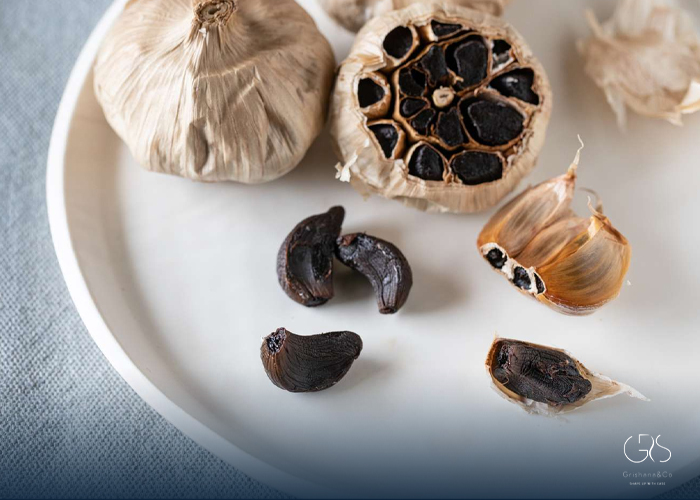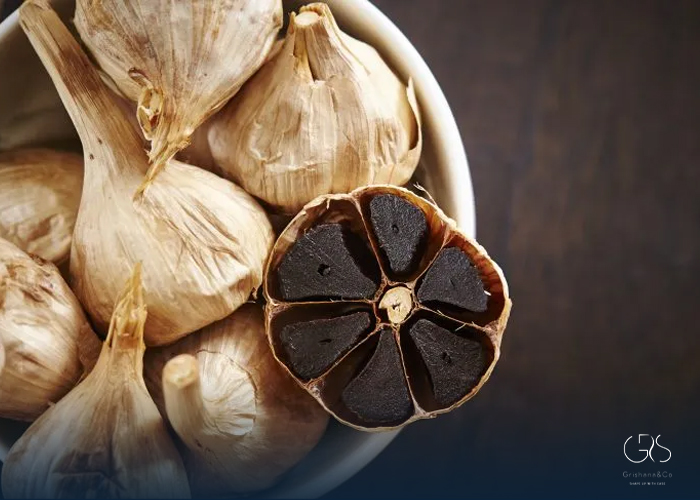In recent years, black garlic has gained increasing popularity for its unique flavor and potential health benefits. Through a fermentation process, fresh garlic cloves are transformed into black garlic, resulting in a sweet and syrupy texture with a complex umami flavor. Beyond its culinary appeal, black garlic is also celebrated for its potential health-promoting properties. In this article, we will explore the diverse perspectives surrounding black garlic and delve into the compelling health benefits it offers.
The Nutritional Profile of Black Garlic
Before delving into its health benefits, it’s essential to understand the nutritional composition of black garlic. According to a study published in the Journal of Food and Drug Analysis, the fermentation process used to produce black garlic leads to a significant increase in certain bioactive compounds, including polyphenols and flavonoids, as compared to fresh garlic. These compounds are known for their antioxidant properties, which play a crucial role in protecting the body from oxidative stress and inflammation, thereby supporting overall health and well-being.
Garlic, including black garlic, is characterized by its low calorie content and is often consumed in small portions. As a result, it does not serve as a significant source of vitamins or minerals. For instance, a nutrition breakdown of three cloves of garlic shows that they contain approximately 13.4 calories, less than 1 gram of protein and fat, and about 2.98 grams of carbohydrates. Additionally, it provides less than 1 gram of fiber and 2.81 milligrams (3% of the Daily Value) of vitamin C.
(Read more about Health Benefits of Vitamin C.)

Potential Health Benefits of Black Garlic
Enhanced Antioxidant Activity
One of the most compelling health benefits of black garlic is its potent antioxidant properties. Antioxidants help neutralize harmful free radicals in the body, thereby reducing the risk of chronic diseases such as cardiovascular issues, cancer, and neurodegenerative disorders. A study conducted by researchers at the Korea Food Research Institute found that black garlic exhibits higher antioxidant activity compared to fresh garlic, suggesting that regular consumption of black garlic may contribute to overall antioxidant support in the body.
Cardiovascular Health Support
The potential cardiovascular health benefits of black garlic have sparked considerable interest among researchers and health enthusiasts alike. A meta-analysis published in the Journal of Nutrition highlighted the impact of aged black garlic extract on improving the lipid profile and reducing blood pressure in individuals with hypertension. This suggests that the consumption of black garlic could potentially contribute to the maintenance of healthy cholesterol levels and cardiovascular function.

Immune System Modulation
Considering the current global focus on immune health, it is notable that black garlic may offer immune-modulating properties. Research published in the Journal of Immunology suggests that the bioactive compounds in black garlic may exert beneficial effects on immune responses, potentially enhancing the body’s ability to combat infections and maintain immune homeostasis. While further studies are warranted, these findings underscore the potential role of black garlic in supporting immune function.
Digestive Wellness
Black garlic’s unique chemical composition may also confer benefits for digestive health. In a study published in the Journal of Agricultural and Food Chemistry, it was demonstrated that black garlic contains higher amounts of fructans, a type of dietary fiber known for its prebiotic effects. Prebiotics serve as fuel for beneficial gut bacteria, promoting a healthy gut microbiome, which in turn may contribute to improved digestive function and overall well-being.

Perspectives on Black Garlic Consumption
While the potential health benefits of black garlic are promising, it’s important to consider diverse perspectives when evaluating its consumption. Some health experts emphasize the need for further research to solidify the claimed benefits of black garlic. Additionally, individuals with existing garlic allergies or sensitivities should exercise caution before incorporating black garlic into their diet.
Conclusion
Black garlic stands as a culinary delicacy with promising health benefits. From its notable antioxidant activity to its potential impact on cardiovascular health and immune function, the diverse perspectives on black garlic reflect a growing interest in its therapeutic potential. As research continues to unfold, it is imperative to approach the consumption of black garlic with an open mind and reliance on credible scientific evidence.
Sources
- Verywell Fit, 4 Benefits of Black Garlic
- Dr. Axe, Are Black Garlic Benefits Even More than Raw Garlic?
- Journal of Food and Drug Analysis, Composition analysis and antioxidant properties of black garlic extract










